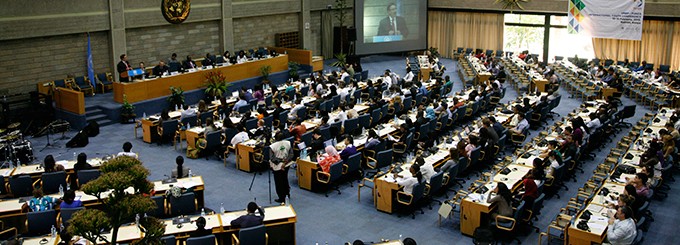September 16, 2008
Please see the full text of CIEL’s statement.
This week CIEL attended the United Nations Commission on International Trade Law’s (UNCITRAL) meetings in Vienna to revise UNCITRAL’s arbitration rules. CIEL’s goal is to improve the rules’ treatment of transparency, public participation and accountability in arbitrations involving a State as a party (“State arbitrations”). From September 11-15, 2006 in Vienna, Working Group II (Arbitration) began work on revising the rules. This revision process is expected to conclude in 2008, the next meeting taking place in February 2007 in New York.
UNCITRAL arbitration rules, which are used around the world, were developed thirty years ago primarily for traditional commercial arbitrations, i.e., arbitrations between private commercial entities regarding business disputes; but they are now used in arbitrations to which one or more States are a party and that raise important public policy issues that penetrate deeply into domestic decision-making.
Unfortunately, the existing UNCITRAL rules do not sufficiently allow either the transparency or opportunities for public participation that characterize modern democracies and are essential to sound and credible dispute settlement. There is thus a serious democracy deficit in transparency, public participation and accountability. This deficiency is not surprising, because the existing rules were drafted primarily, if not exclusively, with commercial arbitrations in mind. In addition, they were adopted before the proliferation of bilateral investment treaties (more than 2000 now exist), which have been used to enabled private investors to initiate numerous disputes against host States in the past ten years.
The background report commissioned by UNCITRAL for the current session of the Working Group II was written by two distinguished members of the arbitration bar with apparently no input from civil society; and it does not adequately reflect transparency and public participation concerns as they apply to State arbitrations. In addition, UNCITRAL has not reached out to civil society or other institutions (e.g., United Nations Environment Programme and the World Trade Organization) with interests and expertise in this area.
In a statement circulated to members of UNCITRAL’s Working Group II, CIEL recommended:
- The issues of transparency, public participation and accountability regarding arbitrations with a State as a party (“State arbitrations”) should be considered separately from commercial arbitrations involving only private parties.
- UNCITRAL should conduct outreach to other parts of the broad UN system (including ICSID, ILO, UNCTAD, UNEP and WHO), the World Trade Organization (WTO) and to civil society to get input on the need for, and mechanisms for increasing transparency, public participation and accountability in State arbitrations.
- UNCITRAL should commission a new report focusing on State arbitrations, to complement the already-prepared report, with participation from a broad spectrum of interested persons in order to ensure that the issues are fully considered and presented.
- Ultimately, UNCITRAL should adopt rules regarding State arbitrations that allow full transparency (with appropriate procedures for protecting confidential business information and State secrets) and meaningful opportunities for public participation.
The UNCITRAL Secretariat’s note is available at: http://www.uncitral.org/uncitral/en/commission/working_groups/2Arbitration.html
For more information, please contact: Marcos Orellana, Director, Human Rights & Environment Program, Washington, DC: [email protected]
